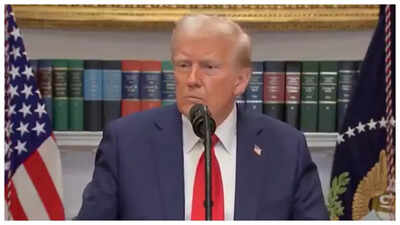
Why targeting international students may backfire on the US economy and trade.
President Donald Trump's administration has launched a sweeping effort to curb the presence of international students in the United States, targeting institutions like Harvard University and pausing the issuance of key student visas.
While framed as a national security move, this aggressive stance could backfire by damaging the US economy, weakening higher education, and pushing future innovators away from American shores.Recently, the Trump administration confirmed it would end all remaining federal grants to Harvard. More critically, it announced a 30-day window to block Harvard's access to new international students. Interviews for incoming foreign students and exchange visa holders are also on hold while the administration weighs enhanced social media vetting.
A federal judge temporarily blocked the enforcement of this order on May 29, 2025, as reported by MSNBC News.Universities and innovation at riskThere are more than 1.1 million international students enrolled in US colleges and universities, representing just under 6% of the total 19.1 million higher education population. According to the Open Doors 2024 Report on International Educational Exchange, over half of these students pursue STEM fields—25% study math and computer science, and nearly 20% are in engineering.
This talent pipeline is crucial. Many skilled immigrants begin their US journey as students. Elon Musk studied at the University of Pennsylvania before obtaining an H-1B visa. Similarly, South African-born Patrick Soon-Shiong completed surgical training at UCLA and went on to invent Abraxane, a major cancer drug. In a 2017 interview, Soon-Shiong told MSNBC News, “We still have the best universities, and I think it's crazy that (foreigners) come here and we train them as masters and PhDs and then we kick them out.
That's ridiculous.”A blow to economic growth and tradeCanceling student visas contradicts the administration's economic objectives. According to the Bureau of Economic Analysis, international students contribute $50.2 billion annually to the US economy—classified as an export. Removing them not only undermines innovation but worsens the trade deficit the administration claims to fight.Pierre Azoulay, an economist cited by MSNBC News, found that immigrants are 80% more likely to start businesses.
Their companies generate 50% more jobs and pay about 1% higher wages than firms started by native-born Americans. Historically, a 1% increase in immigrant population has correlated with a 15% rise in patents per capita, fueling long-term economic growth.National security or national self-sabotage?The administration insists it is safeguarding national security by scrutinizing students' political affiliations and online activity.
Secretary of State Marco Rubio stated the US will increase visa vetting for Chinese students tied to the Communist Party, as reported by MSNBC News. However, experts warn that overreach could alienate talented students and bolster rival nations.As MSNBC News noted, this policy threatens to “lock their smartest students in a communist dictatorship” while weakening US innovation during an ongoing trade war. Trump's immigration crackdown may serve short-term political goals, but its long-term cost to the US could be far greater.

 1 day ago
56
1 day ago
56



























 English (US)
English (US)